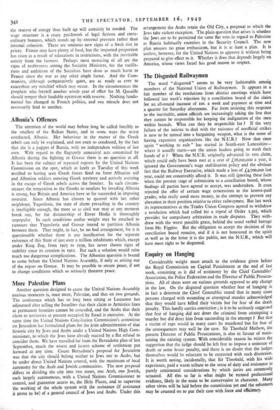More Palestine Plans
Another question designed to cause the United Nations Assembly anxious moments is, once more, Palestine, and that on two grounds. The conference which has so long been sitting at Lausanne has adjourned after telling the Israelites that their claim to Armistice lines as permanent frontiers cannot be conceded, and the Arabs that their claim to territories at present occupied by Israel is excessive. At the same time the United Nations Conciliation Commission's committee on Jerusalem has formulated plans for the joint administration of that historic city by Jews and Arabs under a United Nations High Com- missioner, to which the Jews have already reacted by a flat refusal to consider them. We have travelled far from the Bernadotte plan of last September, much the wisest and justest scheme of settlement put forward at. any time. Count Bernadotte's proposal for Jerusalem was that the city should belong neither to Jews nor to Arabs, but be under direct United Nations control, with the maximum of local autonomy for the Arab and Jewish communities. The new proposal differs in dividing the city into two zones, one Arab, one Jewish, each largely autonomous, with a United Nations Commissioner to control, and guarantee access to, the Holy Places, and to supervise the working of the whole system with the assistance (if assistance it prove to be) of a general council of Jews and Arabs. Under this arrangement the Arabs retain the Old City, a proposal to which the Jews take violent exception. The plain question that arises is whether the Jews are to be permitted the same flat veto in regard to Palestine as Russia habitually exercises in the Security Council. The new plan arouses no great enthusiasm, but it is at least a plan. It is useless, however, for the United Nations to approve it without being prepared to give effect to it. Whether it does that depends largely on America, whose views Israel has good reason to respect.


































 Previous page
Previous page